要求:
- 安装实验环境与工具:nginx、gunicorn、gevent、curl、ab(apache 压力测试工具)等等
- 测试用程序: 自学教程 4.2 读写字典服务 definitions_readwrite.py。 请按需要在此基础上改写程序,必须使用 MongoDB 数据库。
- 准备 4 台电脑,记录下每台电脑配置。其中一台,安装 MongoDB ,不提供其他服务。
- 使用测试工具,测试单进程同步、Tornado 异步(需要改写程序和异步驱动)、GEvent 异步(需要使用wsgi方式启动)方式的性能。
- 使用测试工具,将前一步骤性能最好的方式,与多进程、多线程同步方式(用gunicorn wsgi方式启动)对比性能。
- 用 4 台电脑,组成一个性能最强的 web 服务
相关代码:
definitions_readwrite.py

1 import tornado.httpserver 2 import tornado.ioloop 3 import tornado.options 4 import tornado.web 5 import tornado.wsgi 6 7 from pymongo import MongoClient 8 from tornado.options import define, options 9 define("port", default=8001, help="run on the given port", type = int) 10 11 class Application(tornado.web.Application): 12 def __init__(self): 13 handlers = [(r"/(w+)", WordHandler)] 14 #client = MongoClient('127.0.0.1', 27017) 15 client = MongoClient('172.18.40.194', 27017) 16 self.db = client["definitions"] 17 print self.db 18 tornado.web.Application.__init__(self, handlers, debug=True) 19 20 class WordHandler(tornado.web.RequestHandler): 21 def get(self, word): 22 coll = self.application.db.words 23 word_doc = coll.find_one({"word": word}) 24 if word_doc: 25 del word_doc["_id"] 26 self.write(word_doc) 27 else: 28 self.set_status(404) 29 30 def post(self, word): 31 definition = self.get_argument("definition") 32 coll = self.application.db.words 33 word_doc = coll.find_one({"word": word}) 34 if word_doc: 35 word_doc['definition'] = definition 36 coll.save(word_doc) 37 else: 38 word_doc = {'word': word, 'definition': definition} 39 coll.insert(word_doc) 40 del word_doc["_id"] 41 self.write(word_doc) 42 43 # if __name__ == '__main__': 44 # tornado.options.parse_command_line() 45 # http_server = tornado.httpserver.HTTPServer(Application()) 46 # http_server.listen(options.port) 47 # tornado.ioloop.IOLoop.instance().start() 48 49 wsgi_app = tornado.wsgi.WSGIAdapter(Application())
tornado_definitions_readwirte.py

1 import tornado.httpserver 2 import tornado.ioloop 3 import tornado.options 4 import tornado.web 5 import tornado.httpclient 6 import tornado.gen 7 import asyncmongo 8 import logging 9 import tornado.wsgi 10 import gevent 11 12 from tornado.options import define, options 13 define("port", default=8001, help="run on the given port", type = int) 14 15 class Application(tornado.web.Application): 16 def __init__(self): 17 handlers = [(r"/(w+)", WordHandler)] 18 #self.db = asyncmongo.Client(pool_id='mydb', host='172.18.40.194', port=27017, dbname='definitions') 19 self.db = asyncmongo.Client(pool_id='mydb', host='127.0.0.1', port=27017, dbname='definitions') 20 print self.db 21 tornado.web.Application.__init__(self, handlers, debug=True) 22 23 class WordHandler(tornado.web.RequestHandler): 24 word = '' 25 26 @tornado.web.asynchronous 27 def get(self, word): 28 coll = self.application.db.words 29 coll.find_one({'word':word}, callback=self.query_callback1) 30 31 def query_callback1(self, response, error): 32 word_doc = response 33 logging.info(response) 34 if word_doc: 35 del word_doc["_id"] 36 self.write(word_doc) 37 else: 38 self.set_status(404) 39 self.finish() 40 41 @tornado.web.asynchronous 42 def post(self, word): 43 self.word = word 44 coll = self.application.db.words 45 coll.find_one({'word': word}, callback=self.query_callback2) # 46 47 def query_callback2(self, response, error): 48 logging.info("haha") 49 coll = self.application.db.words 50 word_doc = response 51 definition = self.get_argument("definition") 52 word = self.word 53 if word_doc: 54 responce = coll.remove({"word": word}, callback=self.delete_callback) 55 else: 56 logging.info("not exit ") 57 word_doc = {'word': word, 'definition': definition} 58 coll.insert(word_doc, callback=self.insert_callback) 59 60 def delete_callback(self, response, error): 61 coll = self.application.db.words 62 word = self.word 63 definition = self.get_argument("definition") 64 word_doc = {'word': word, 'definition': definition} 65 coll.insert(word_doc, callback=self.insert_callback); 66 67 def insert_callback(self, response, error): 68 word = self.word 69 definition = self.get_argument("definition") 70 word_doc = {'word': word, 'definition': definition} 71 self.write(word_doc) 72 logging.info("insert:") 73 logging.info(response) 74 self.finish() 75 76 if __name__ == "__main__": 77 tornado.options.parse_command_line() 78 http_server = tornado.httpserver.HTTPServer(Application()) 79 http_server.listen(options.port) 80 tornado.ioloop.IOLoop.instance().start() 81 #gevent.monkey.patch_all() 82 #wsgi_app = tornado.wsgi.WSGIAdapter(Application())
/etc/nginx/nginx.config

1 #user nginx; 2 worker_processes 4; 3 4 error_log /var/log/nginx/error.log; 5 pid /var/run/nginx.pid; 6 7 events { 8 worker_connections 4096; 9 use epoll; 10 } 11 12 http { 13 # Enumerate all the Tornado servers here 14 upstream frontends { 15 server 172.18.43.53:8001 weight=3; 16 server 172.18.42.169:8001 weight=4; 17 server 172.18.43.132:8001 weight=3; 18 } 19 20 include /etc/nginx/mime.types; 21 default_type application/octet-stream; 22 23 access_log /var/log/nginx/access.log; 24 25 keepalive_timeout 65; 26 proxy_read_timeout 200; 27 sendfile on; 28 tcp_nopush on; 29 tcp_nodelay on; 30 gzip on; 31 gzip_min_length 1000; 32 gzip_proxied any; 33 gzip_types text/plain text/html text/css text/xml 34 application/x-javascript application/xml 35 application/atom+xml text/javascript; 36 37 # Only retry if there was a communication error, not a timeout 38 # on the Tornado server (to avoid propagating "queries of death" 39 # to all frontends) 40 proxy_next_upstream error; 41 42 server { 43 listen 80; 44 45 # Allow file uploads 46 client_max_body_size 50M; 47 48 location ^~ /static/ { 49 root /var/www; 50 if ($query_string) { 51 expires max; 52 } 53 } 54 location = /favicon.ico { 55 rewrite (.*) /static/favicon.ico; 56 } 57 location = /robots.txt { 58 rewrite (.*) /static/robots.txt; 59 } 60 61 location / { 62 proxy_pass_header Server; 63 proxy_set_header Host $http_host; 64 proxy_redirect off; 65 proxy_set_header X-Real-IP $remote_addr; 66 proxy_set_header X-Scheme $scheme; 67 proxy_pass http://frontends; 68 } 69 } 70 }
环境配置:
$sudo pip install gunicorn
$sudo pip install greenlet
$sudo pip install eventlet
$sudo pip install gevent
$sudo apt-get install apache2-utils (用于压力测试)
实验步骤:
UML部署图:
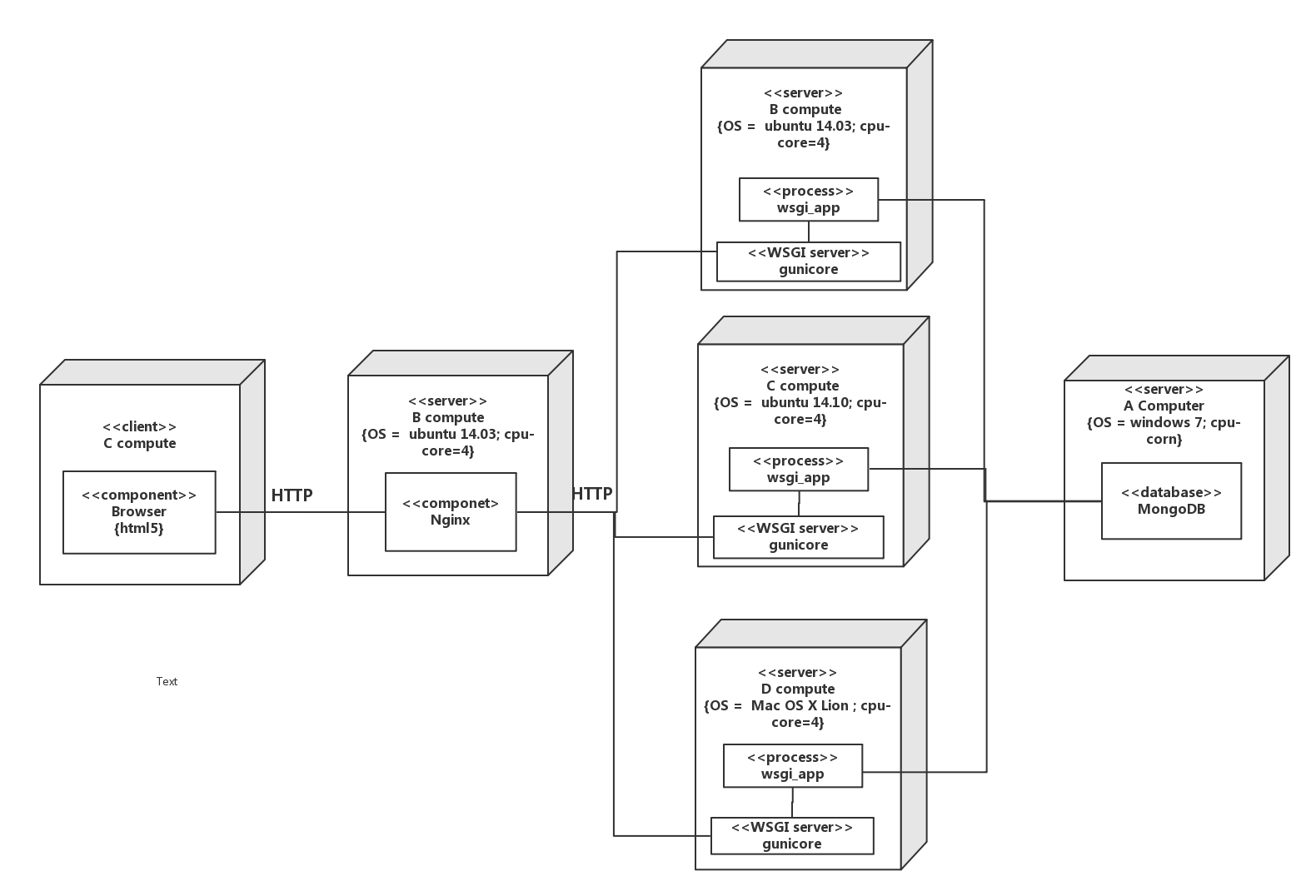
以下的测试均在测试量为10000,并发量为100的情况下进行
1)进行单进程同步压力测试
a)在A机上开启Mongodb服务, 命令如下:mongod.exe --dbpath "C:Program FilesMongoDBdatadb" ;
b)在B机中启动nginx;
c)在C机, B机,D机中都运行python definition_readwrite.py作为应用服务器
e)在C机中进行压力测试,命令为ab ab -n 1000 -c 10 http://localhost/ (localhost和端口号需要换成代理机的IP和端口号)
f)可查看测试结果
2)其他的测试也类似,其中可通过查看如下的测试结果图比较
截图:
单进程同步:
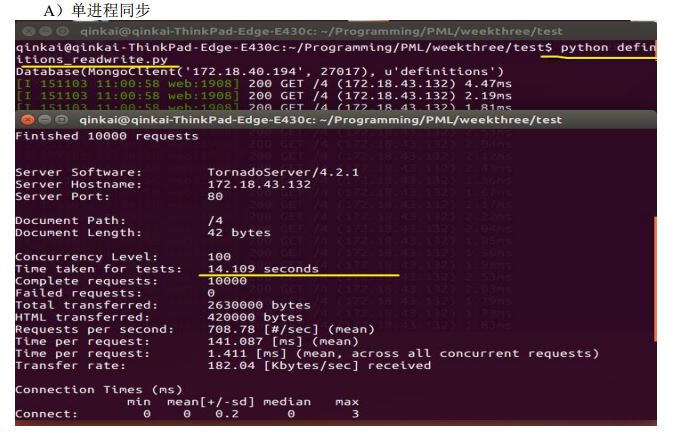
tornado异步:
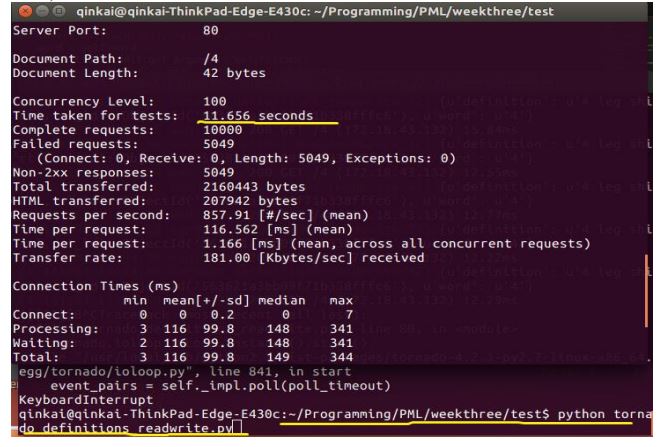
Gevent
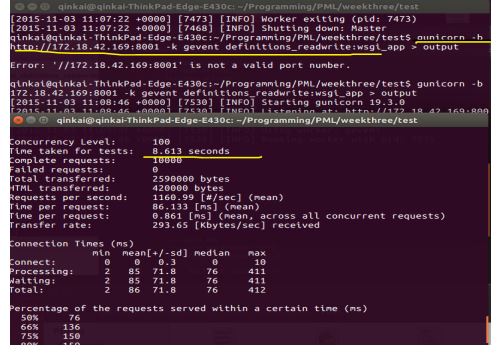
多进程同步:
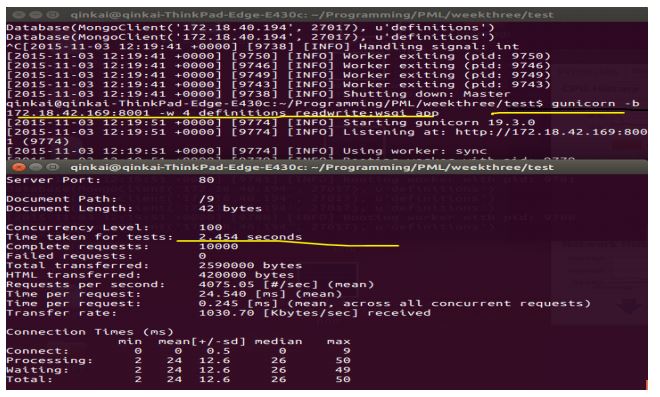
多线种同步:
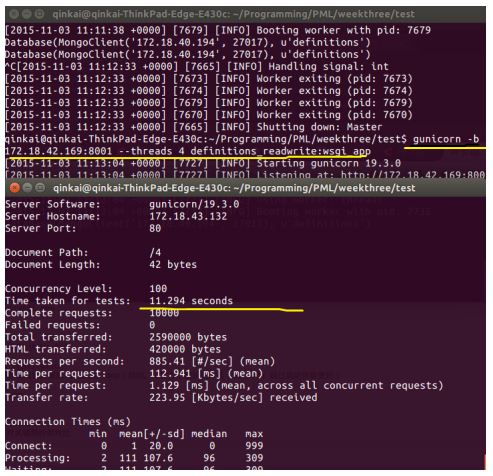
说明 :1)要本地运行gunicorn时的命令一般为gunicorn code:application; 这样启动gunicorn,其默认作为一个监听127.0.01:8000的web server,可以通过本机访问,如果需要通过网络来访问gunicorn服务的话,需要使用-b命令来绑定不同的地址,同时设置监听端口,也就是需要使 用本机在网络中的IP地址加端口号;
2)修改程序为tornado异步的,不仅方式要是异步的,同时也需要使用异步的mongodb;
3) 用gevent运行程序,会自动将同步的程序的每个进程使其都支持IO阻塞异步的。
